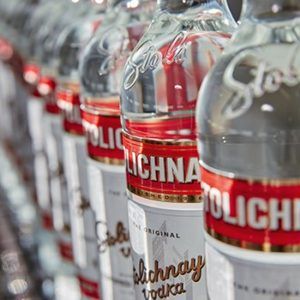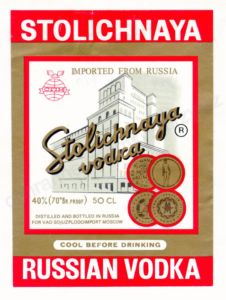Former Yukos Shareholders Seize Russian Vodka Brands in the Netherlands
 The dispute between Russia and the former majority shareholders of the now-defunct oil and gas company – Yukos has been ongoing since 2014 when the Permanent Court of Arbitration (PCA) tribunal ruled against Russia for illegal expropriation of the company and awarded its former shareholders a record-breaking $50 billion. Since then award creditors continue their strenuous efforts in seeking enforcement of the award in various jurisdictions to reach and seize some assets.
The dispute between Russia and the former majority shareholders of the now-defunct oil and gas company – Yukos has been ongoing since 2014 when the Permanent Court of Arbitration (PCA) tribunal ruled against Russia for illegal expropriation of the company and awarded its former shareholders a record-breaking $50 billion. Since then award creditors continue their strenuous efforts in seeking enforcement of the award in various jurisdictions to reach and seize some assets.
At the beginning of May 2020, a Dutch court granted Yukos’ ex-shareholders trademark rights over several renowned vodka brand names, that were registered in the Netherlands and belonged to a Russian state-owned company – Soyuzplodoimport.
Russian government’s legal battle over trademark rights to iconic vodka brands
Leningrad Distillery produced the first batch of vodka under the Stolichnaya brand as early as in 1941. Later Soviet government established Soyuzplodoimport as the central export department of the USSR’s Ministry of Food Industry to export vodka to foreign countries. Before the dissolution of the Soviet Union, Soyuzplodoimport registered various vodka trademarks in its own name with the USSR’s trademark agency back in the 1960s, and in a number of other foreign countries. For instance, the United States Patent and Trademark Office registered the Stolichnaya trademark in the U.S. in 1969.
The Soviet Union’s collapse led to the process of market transformation with the privatization of many enterprises. The current dispute over the trademark rights to the world-famous vodka brands involves a series of hotly contested transactions allegedly transferring Soyuzplodoimport’s intellectual property rights to privately held companies. The Supreme Commercial Court of Russia had declared the transfer of trademark rights void as early as in 2001. The sale and subsequent assignments of rights remain in dispute across different jurisdictions over the past 20 years.
With an aim to protect and recover exclusive intellectual property rights to the spirits brands (see Soyuzplodoimport’s bylaws), Russia founded an identically named enterprise Soyuzplodoimport to assume the functions and operations of its Soviet predecessor. Russian Soyuzplodoimport is established in the form of the Federal Treasure Enterprise.
According to the Russian Civil Code, a treasury enterprise is a “unitary enterprise”, that is a commercial organization which has not been granted the right of ownership of the property assigned to it by the owner. Therefore, the property granted to Soyuzplodoimport remains state property. Further, under the Russian Civil Code, a unitary enterprise possesses the granted property only in pursuance of the purposes of its activities, as per its bylaws.
The organizational form of Soyuzplodoimport played a twofold role in terms of Russia’s litigation efforts to regain the trademark rights. For example, the United States Court of Appeal for the Second Circuit had dismissed Soyuzplodoimport’s claim for lack of standing.
The court inquired whether as a matter of Russian law Soyuzplodoimport was assigned trademark rights in the first place. In rejecting standing the court found dispositive that Russia retained intellectual property rights, whilst Soyuzplodoimport was merely an “operative administrator“ of such property, and it held Soyuzplodoimport lacked the right to sue for damages on those trademarks.
 On appeal, the court held that the U.S. federal court was prohibited from inquiring into the validity of an act of a foreign sovereign’s assignment of its right to sue. Whether Soyuzplodoimport, however, has any right to the intellectual property in the U.S. over the vodka brands remains an open question.
On appeal, the court held that the U.S. federal court was prohibited from inquiring into the validity of an act of a foreign sovereign’s assignment of its right to sue. Whether Soyuzplodoimport, however, has any right to the intellectual property in the U.S. over the vodka brands remains an open question.
As such, the organizational form of Soyuzplodoimport implies that Russia has merely “entrusted” its property and the Russian government remains de facto and de jure owner of intellectual property rights. It is this exact provision of the Russian law that came to form the legal basis for seizing of Soyuzplodoimport’s property in Benelux by the Yukos shareholders, whose award against Russia for $50 billion remained unfulfilled.
Russian government regains trademark rights over vodka brands in Benelux
Earlier this year the Supreme Court of the Netherlands upheld a lower court’s ruling recognizing Russia’s rights to the several vodka trademarks. The issue before the court was whether Spirits International had validly obtained the trademark rights over the vodka brands in the Netherlands. The Supreme Court denied an appeal against a decision adjudging the exclusive right to several vodka trademarks in Benelux counties to the federal state enterprise Soyuzplodoimport.
The Supreme Court’s decision marks the end of excessively lengthy judicial proceedings between the parties in the Netherlands. The District Court of Rotterdam ruled in 2006 that Spirits International had acquired its rights illegally, which were followed by appeals proceedings. In 2012 the Court of Appeal upheld the ruling of the District Court of Rotterdam, the court concluded that Spirits International had not obtained the trademarks in good faith. In 2015 the District Court of Rotterdam ruled that Spirits International had to stop sales of Stolichnaya and Moskovskaya brands and awarded damages for the illegal use of the trademarks.
Finally, in 2020, Soyuzplodoimport prevailed in a lawsuit over Spirits International before the Supreme Court of the Netherlands and successfully reclaimed its rights to Stolichnaya and Moskovskaya vodka brands in Benelux countries. The court ordered Spirits International to pay to Soyuzplodoimport all its profits attributable to the use of the vodka trademark names since 1999.
Award creditors in Yukos PCA arbitration successfully seized trademark rights to vodka brands
The victory did not last long. In February 2020, the Hague Court of Appeal reinstated the PCA arbitral awards against the Russian Federation. Since the first verdict in 2014, an additional interest of $7 billion for non-payment accrued, raising the total sum of the awards to approximately $57 billion.
Following that judgment, the Hague District Court granted the exequatur orders allowing the enforcement of the arbitral awards in the Netherlands. Award creditors acted promptly and sought to seize the Netherlands-based assets of Soyuzplodoimport, namely the rights to the vodka trademarks, that the company has obtained just several months earlier in two-decade-long litigation.
As discussed above, Soyuzplodoimport, as a Federal Treasure Enterprise, was merely an “operative administrator“ of the property of the Russian Federation. This in fact provided a legal ground for the Dutch court to strip the rights to the Stolichnaya and Moskovskaya vodka brands in the Netherlands and transfer them to Yukos’s ex-shareholders.
As Russia declines to honour the PCA’s arbitral awards, award creditors continue making efforts to seize Russian assets abroad, including the Netherlands. This problem is compounded by legal restrictions that limit seizure of certain state-owned property (i.e. property used for diplomatic purposes) or by the complexities in proving the link between Russia and legal entities to hold them accountable for the award debt owed by Russia.
In this particular case, however, these problems do not exist: the type of property is not protected by the doctrine of the state immunity and the organizational form of the enterprise clearly indicates the connection with the state, whilst Russian government also confirmed its close proximity to the assets in separate litigations and, thus, shall be estopped from claiming private, individual character of Soyuzplodoimport’s assets.
Concluding remarks
The ultimate objective of a party in an arbitration setting in most cases is to get paid. Yukos case is a vivid example of how complicated the enforcement of an arbitral award against a State might turn out to be in practice. This particular case demonstrates an enforcement strategy of the Yukos ex-shareholders seeking to seize assets across the globe.
The Dutch court’s decisions cannot be regarded as setting a precedent for other jurisdictions. In fact, the outcome of litigation over Soyuzplodoimport’s rights to vodka trademarks varies from one country to another. The ultimate success of Yukos award creditors, in turn, depended on Soyuzplodoimport’s successful retention of its intellectual property rights from Spirit International in each jurisdiction.
Nevertheless, the decision is important in part due to the fact that disputes over Soyuzplodoimport’s rights still remain unsettled in many jurisdictions. Yukos award creditors, therefore, are expected to pursue further enforcement proceedings against Soyuzplodoimport’s assets in other jurisdictions in which it will prevail over Spirit International.











